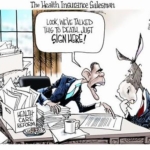The Transparency Conundrum
 Seems there’s a lot of opposition among Democrats in Congress over the idea of posting bills online for 72 hours before they’re voted on. Obviously with an eye on health care reform legislation, almost all Republicans and some Democrats are for it, while the congressional leadership is against it.
Seems there’s a lot of opposition among Democrats in Congress over the idea of posting bills online for 72 hours before they’re voted on. Obviously with an eye on health care reform legislation, almost all Republicans and some Democrats are for it, while the congressional leadership is against it.
There’s a move afoot to institute the rule in the House; the Senate rejected the idea last week.
Seems politicians don’t much like the unwashed masses seeing the details of what they’re doing. That includes the President, who promised to put bills online for five days of public comment before signing them. That mostly hasn’t happened.
What could be wrong with letting the people read legislation before it’s voted on? A lot, actually. Bills are very confusing, written in arcane legal language, and full of references to other documents. A flood of comment to members on a pending bill, some of it inevitably organized by opponents for the purpose of attacking the bill, could completely obstruct the legislative process.
What could be wrong with a requirement to give members of Congress and their staffs a reasonable amount of time to read and study legislation before it’s voted on? Nothing, actually. Some long, highly complex, and very expensive legislation has been voted on recently within hours of the completion of the final draft. Many members voted for it before they read it. But that’s nothing new — it’s been going on for years.
Therein lies the transparency conundrum. Making legislation available for public review and comment before it’s voted on would be like watching sausage being made. That’s not something we need to do, particularly when we already know that some of our fellow citizens will try to poison the sausage. But there should be enough transparency in the process to permit citizens to be confident that their representatives have enough time to read legislation before they vote.
I know from working and commenting on legislation as a legislative liaison officer and an Army staff officer that it’s a daunting process. I worked with a few members of Congress and many congressional staffers who struggled mightily to get things right, and more public kibitzing and nit-picking isn’t going to help.
And before we get all righteous about this and attack those Stalinist Democrats for denying democracy-loving Republicans time to read bills, let’s remember that both parties have been guilty of rushing legislation through the process. The way the Republicans pushed the Patriot Act through in 2001 is a good example.
The best thing we can do is let our representatives know what we want. Let them struggle with the messy details of legislation. That’s their job.
(This article was also published at Opinion Forum.)
Welcome to the United States of America, Incorporated.